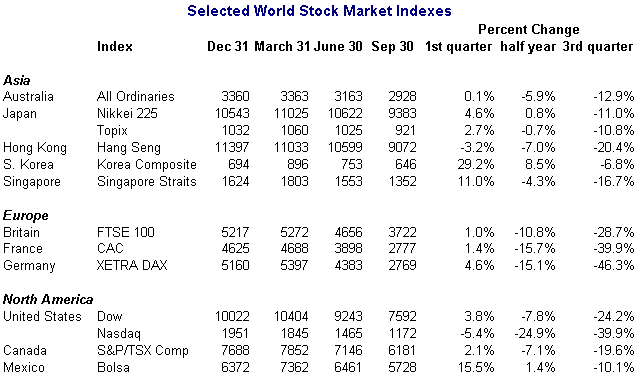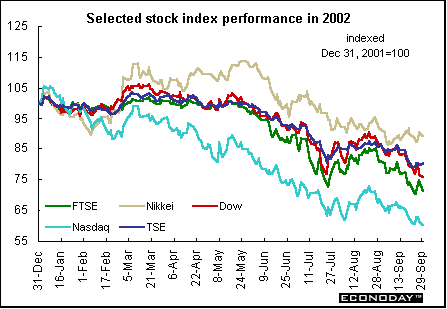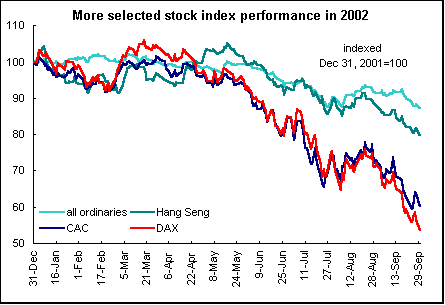If investors were disappointed with the dismal performance of equities in the second quarter, the third quarter appalled them. Equities indexes sank to levels not seen since the mid-90s or worse. Indexes had been up after the first quarter but were then hit by the spectacle of corporate malfeasance, a wave that killed investor trust in earnings data and analysts' evaluations. Worries were compounded in the third quarter by the possibility of a second war with Iraq. Investors do not like uncertainty to put it mildly. And there was no solace in economic data either as virtually every major country reported weak growth. As the quarter drew to a close, headlines swept by of indexes hitting lows not seen in "x" years. The Frankfurt DAX has the dubious honor of having lost the most in 2002. The table below shows the change at the end of each quarter with year-end 2001.

Economics and earnings, disappointments accumulate
Economic indicators continue to present a mixed picture. While the U.S. continues to grow slowly (as one would expect after a relatively shallow recession) growth prospects elsewhere are not assured. Of the group of three (Japan, Germany, the U.S.), the U.S. is the only one that does not rely on exports for growth, instead relying on domestic consumer demand. Germany's consumers are among the missing as are those from Japan, but for different reasons. In Japan, years of deflation have produced a reluctance to buy because consumers anticipate that prices will continue to fall. The unemployment rate is also near a record high for Japan, but is believed to understate the problem. In Germany, unemployment is climbing again. And expected price reductions have not materialized after the euro became fiat throughout the eurozone on January 1. Consumers complain that prices have risen, however much official statistics belie this.

Earnings have been disappointing, in part due to unrealistic expectations on the part of investors. Investors, still hoping for the pace of the late 90s, are perhaps failing to extract the effect of past accounting tricks on overblown income statements. Awareness of this hangover effect may help sober interpretations of third-quarter earnings. Overseas indexes tend to track developments in the United States so closely that sometimes their own economic performance and national events are overshadowed. Any sign that the U.S. consumer might be scaling back produces a knee-jerk reaction overseas and exporters' stocks get hit. Countries like Germany and Japan rely on export industries for economic growth and the U.S. consumer is their best customer.

Political uncertainties abound
There were national elections in both France and Germany in the quarter. In France, the extreme right wing shook up the complacent French electorate. The socialist premier was thrown out of office and replaced with a member of Jacques Chirac's conservative coalition, ending years of a split government. In Germany, the socialists, thanks to their coalition partners, barely held control. Many ask how needed economic reforms can occur with such a slim majority. But the biggest political uncertainty remains the outcome between the U.S. and Iraq as war rhetoric escalates. Investors fret over the impact on oil supplies, the potential that a conflict would widen, and disputes with allies over the veracity of the U.S. position.
Changes on the horizon?
In the eurozone, rules forcing investors to buy and sell shares only through stock exchanges are to be scrapped as part of an attempt to shake up the European Union's financial markets. On the day that Germany's Deutsche Börse announced it was closing the Neuer Markt (Europe's "Nasdaq", which listed high tech go-go stocks), it emerged that the European Commission will let investors trade shares directly with other shareholders and banks, bypassing national stock exchanges. Experts called it the most important part of the commission's effort to create a single financial market and argued that it could trigger the biggest change in a decade for Europe's securities markets. Large stock exchanges, such as the London Stock Exchange, are likely to benefit, with Europe's smallest exchanges losing out. Large investment banks are also likely to gain. Another proposal aims to ease cross-border trading, which at present is a small fraction of EU securities. The costs are high plus there is a maze of rules - different in each member state.
Two weeks ago, Japan's beleaguered equities markets were momentarily shaken by the Bank of Japan's shocking proposal to buy some of the estimated $200 billion of shares from struggling banks. These purchases would not involve the equities markets per se. Bank of Japan officials have attempted to clarify their proposal while government proposals, designed to complement the BoJ plan, were met with skepticism as explanations were vague and often conflicted with each other. This was particularly true at the just completed G-7 finance ministers' summit in Washington. On Monday, Prime Minister Junichiro Koizumi replaced his top banking regulator with someone who is more amenable to using public money to bail out banks. The problem is that banks may have to subtract losses on their stock holdings from their capital when they close their books on the fiscal first half. With the Nikkei at 19-year lows, worries are high that some banks may not have enough capital to meet international requirements.
BOTTOM LINE
September is often described as the cruelest month for equities. This September was no exception. Some of the reasons are time worn while others are unique to this business cycle; however they boil down to weak economic growth, weak earnings and worries about the escalating likelihood of war with Iraq. With investor confidence already eroded by corporate misdeeds and the absence of good news, especially on the geo-political front, it didn't take much to push indexes lower. Even when there was good news, it was shunted aside as noise. However, there is some good news. The U.S. economy - the world's engine of growth - continues to grow, although not at the breakneck speed some would like. Europe shows signs of finally undertaking the restructuring its financial markets need to erase structural impediments. Japan appears to be moving in its own fashion to bring the banking crisis under control. Tackling structural problems is much more difficult in times of slow growth. Despite the prospects of a third negative year for most of the indexes followed here, investors should take solace. The painful weeding out of corporate miscreants and changes in the way Wall Street analysts do business can only help to re-establish trust in equities markets and provide a foundation for future growth.
Anne D. Picker, International Economist, Econoday
|
![[Back To Archive]](../../../images/backtoarchive.gif)
